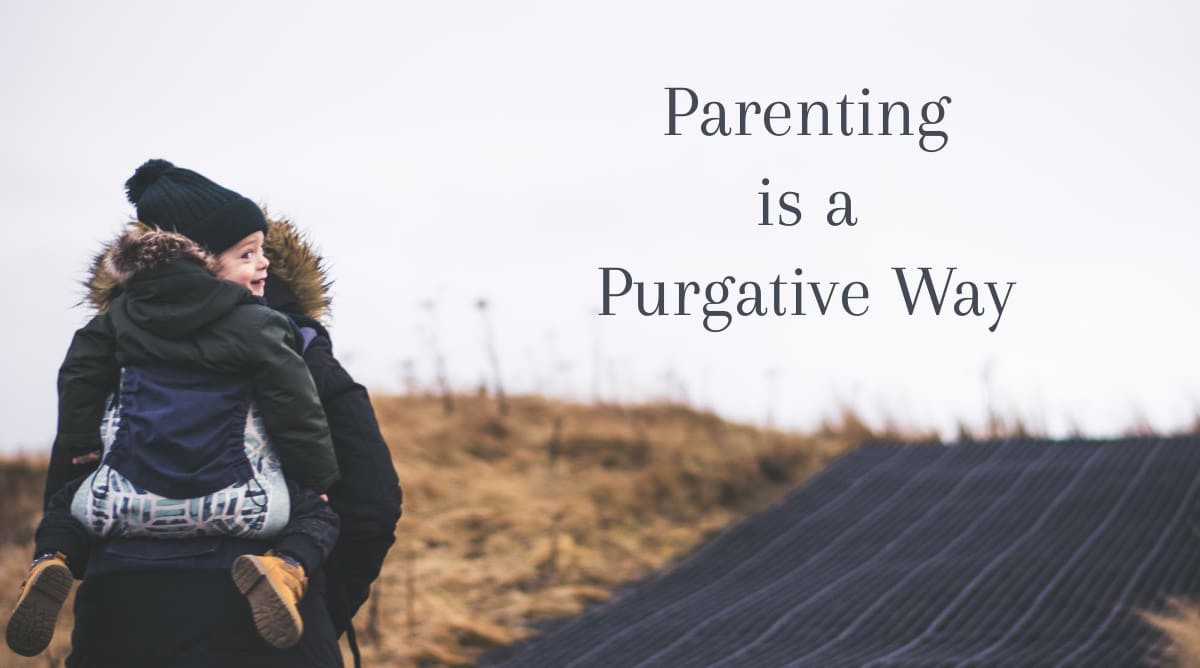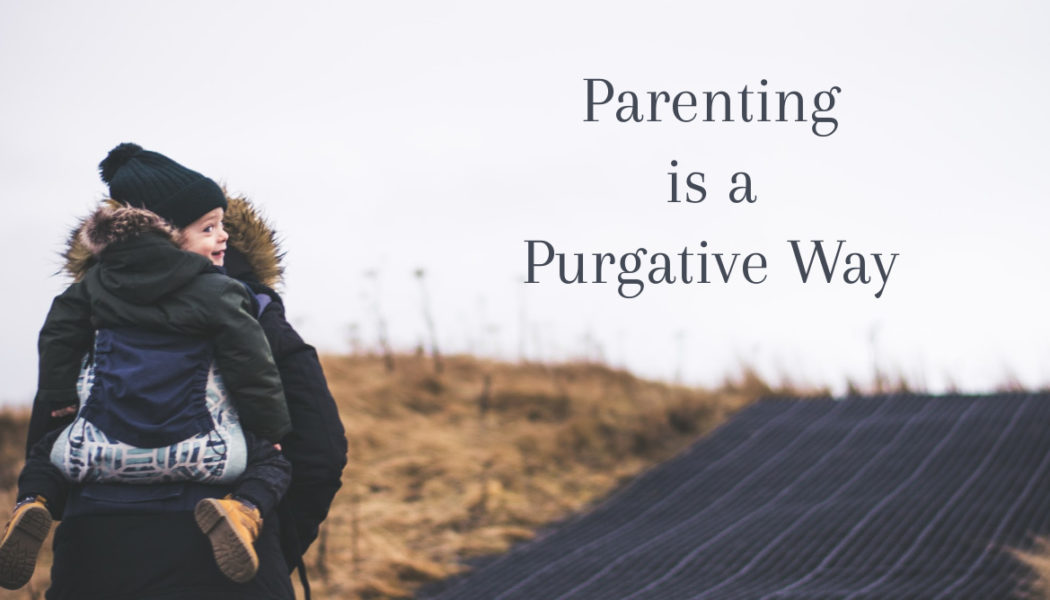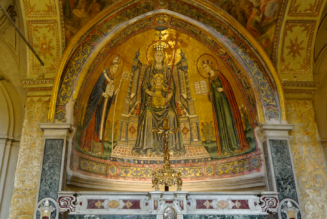
A few weeks ago, in a rare burst of organizational energy, I was cleaning out some files when I came across a folder that hadn’t been touched in…I don’t know how long. Before we moved ten years ago, for sure, and probably long before that.
The faded purple folder contained a stapled stack of papers, carefully typed.
It was my attempt at creating a ‘rule of life’ for myself, as a young mother. The date at the top reminded me that I’d written it after the third of my six children was born, 19 years ago. I’d been in the middle of a busy season which was getting busier and craving, aching for, a sense of normalcy—and holiness—in the chaos.
It was ten pages long.
Ten pages of self-imposed prayers and practices, carefully scripted sacrifices, and rules for myself that included hourly, daily, weekly, monthly and yearly devotions.
Commitments I admittedly had little success in keeping.
I ran my fingers over the words, remembering the woman who’d written them. The woman who was determined to do whatever was needed to become better, worthier. The young mom who felt flung about by the constant demands of a young household with never ending needs and wanted a structure as strict as a convent to keep her grounded and to make her good enough.
I smiled.
What I hadn’t known then was that for all the rules I’d written, the Lord had a better plan for purgation. A rule of life that was perfectly — perfectly — suited for my sanctification. It was the rule of surrender. The rule of self-sacrifice. Of death to self and death to dreams and death to everything that approached self-love. Of death, even, to my own plans for sanctity. There would be no room for selfishness or self-will in this rule.
This rule was simply my primary vocation. It was marriage and parenthood.
And this rule, written by my Maker, would slay me and resurrect me on a daily—hourly, often—basis. When I surrendered to it, it did a job no spiritual planner could do. It radically emptied me of me.
I didn’t realize it at the time, of course. In the sleep-deprived fog of the first fifteen years of motherhood, it felt like I was stumbling in circles.
But now I see that I was flailing headfirst toward God, and that He was drawing me to Himself in what often felt like a long night of nothingness.
I wasn’t able to follow a strict hourly rule. What I did do was stay faithful to the sacraments. I prayed when time and my tinies allowed, sometimes even for hours at time when I held the baby. I followed the rhythms of the liturgical year as best I could. I offered my days to God and tumbled into bed thinking of Him. I kept falling, but I fell forward.
And later, when life settled a little, after my youngest was born, I began to read and take classes and learn more about the life of grace.
I studied, with a great deal of interest, the three ways of the spiritual life. Church tradition, through the writings of the saints, reveals that there are some predictable stages in our interior life and our journey towards God. It’s a simplification of what is ultimately an individual and mysterious process, but still helpful in understanding the movement of the soul deeper in love and union with the Lord.
I learned that the purgative, illuminative, and unitive ways pointed out the progress of the soul.
The earliest stage of discipleship, the purgative way, is a season of more strenuous effort: putting to death sin and establishing a practice of prayer, committing to a life of grace and beginning to cooperate with it. (It’s a good season for beginning rules!)
The illuminative way is the path of a maturing soul who has walked with Christ through suffering and has allowed him to strip away all that is most selfish and sinful, so that the Lord can dig into the soul’s soft, good soil and grow miracles of restoration and wholeness.
The unitive way is the way of a soul led into the wilderness of God’s eternal solitude. Of inner houses totally at rest in the calm assurance of their human will surrendered to and suspended in His Will. It is the way of saints, and what we all were meant for.
As I meditated—over years—on how a person spiritually matures, I realized that no self-imposed purgation could possibly be as effective as the one we’re called to surrender to in parenthood. My eyes were opened to how precise and beautiful God’s plan is—that the living out of our vocation purposefully, intentionally, of giving in and giving way and saying yes to every cry and every sticky summons and sleepless night—and saying no to what my wounded nature wanted so badly—was a radical kind of inner house cleaning.
It was not a deep sweep for the sake of emptiness. This work is not some kind of soul minimalism. It is a purging to make space for Someone. Someone who has room to exhale in a surrendered soul—only possible because there isn’t enough of us left to get in His way. He can finally be the Way.
Because in the end, there is one Way – Jesus Christ Himself, who tells us, “I am the Way.” He is the entry point and the bridge, to use the image of St. Catherine of Siena, to the life of the Trinity. He is the way of purgation, of illumination, of union. There is no one and nothing else. The Way of the Cross is His Way, and we can only say ‘to whom should we go?’ when the world tries to tell us otherwise.
And while I don’t claim that I or anyone else advances automatically through the purgative or any other way because we accept or even embrace the crosses that come with family life, still we cannot help but see, once we are out of the fog, that it is a pretty precise and profoundly incarnational, Christ-centered path.
I also don’t want to discourage anyone from creating and living by a rule or plan of life and love. Let’s just say: keep it realistic and elastic and in line with your state of life and your season. And see how sweet, and how gentle, and how incredibly merciful is our God who asks us to follow His own example and empty ourselves on a daily basis for those we love the most.
Who anoints our families and, in His generosity, even the world with the same oil flowing from our very crushing.
As I wrote in Blessed is She’s Lenten devotional, New Wine, “our brokenness is the place through which He makes Himself present in the world again. Our suffering, redeemed by our yes, draws down all the power of the Crucified One to bless the world and make not only us, but all things, new again.”
God’s path of parenthood is painful, purifying, purgative—and perfectly designed to make us new and bring us and those we love home to Himself.
I rose up from the acres of self that I tended with passion
and defended with flurries of pride;
I walked out of myself and went into the woods of God’s mercy
And here I abide.
-Jessica Powers (Sr. Miriam of the Holy Spirit, OCD)
Image courtesy of Unsplash, modified.









